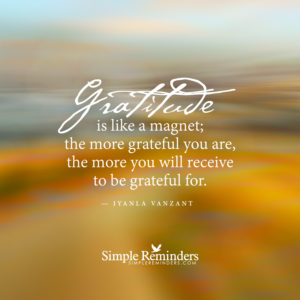
I have so many questions as I start to delve into studying the effects of gratitude. Here are a few: Why is gratitude needed? Does it really change things that much? If so, then why is it so hard to be grateful at times? Why does it work? If gratitude does such amazing things, then why don’t all of us have more of it? Why aren’t we taught more about it? And here’s the really hard question to answer: HOW can we LEARN and TEACH gratitude better, making it an integral part of ourselves?
Lets start with my first question: Why is gratitude needed? Shouldn’t God just want us to be happy and therefore bless us all the time? Surely God doesn’t need our gratitude. Shouldn’t living our lives create the sense of well being and happiness to make us constantly content and happy?
After reading a bit, I found that there’s actually more to feeling good all the time than being blessed, having a good life and getting stuff. I found out what the big deal is when I studied something called hedonic adaptation.
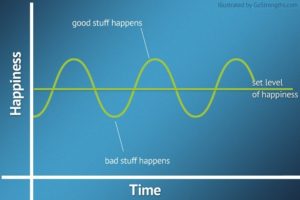 Hedonic adaptation is where we get accustomed to the good or bad things in our lives and adapt to what we have as the norm. We stop seeing things as good or helpful, but take them for granted and develop the expectation that they will always be there, even if they were a great upgrade from what we’ve had in the past. That means every achievement, gift, opportunity, blessing, and good relationship we will get used to and take for granted eventually. We won’t enjoy them as we once did or find them to be that interesting after awhile. What we worked so hard for in the past will eventually be something that is expected and the norm. Because of hedonic adaptation, we always need something MORE to make us happy. That blasted law of eternal progression, or put another way, eternal discontent.
Hedonic adaptation is where we get accustomed to the good or bad things in our lives and adapt to what we have as the norm. We stop seeing things as good or helpful, but take them for granted and develop the expectation that they will always be there, even if they were a great upgrade from what we’ve had in the past. That means every achievement, gift, opportunity, blessing, and good relationship we will get used to and take for granted eventually. We won’t enjoy them as we once did or find them to be that interesting after awhile. What we worked so hard for in the past will eventually be something that is expected and the norm. Because of hedonic adaptation, we always need something MORE to make us happy. That blasted law of eternal progression, or put another way, eternal discontent.
The up side of hedonic adaptation is that it can provide the drive to grow, imporove and progress, even when we have “enough”. Growth is a human need that causes us to feel happy and fulfilled. Without growth we easily feel depressed, disheartened, selfish and pessimistic. Therefore hedonic adaptation is good because it get us to grow, even after we’ve accomplished something new.
There is always a dark and a light side to every gift. The dark side of hedonic adaptation is big and if we don’t act with awareness we will be under it’s power instead of it being under ours. If we constantly are looking to the next gift, accomplishment, opportunity, relationship, or anything else for us to feel happy, we will always be unhappy and discontent. Things don’t bring joy, but newness is exciting and causes us feel like we’re growing again, which rememeber, brings fulfilment and joy. But we can find joy in new ways in our old relationships, things, experiences, and gifts. One of the ways we bring newness to something that is “old” is through gratitude. Seeing all the ways that what we already have is exactly what we want, need and have created puts US in control of the feelings inside of us and the things around us, instead of the things in control of us and our feelings.
Happily, we offset the negative side of hedonic adaptation with gratitude. Gratitude causes us to see the normal as special again. We remember what we liked so much about it when we first received the gift, opportunity, acievement, blessing or relationship. It becomes fresh again. Gratitude in time causes our brains to start to process life differently, because we’ve trained them to see through grateful and receptive glasses. No more taking things for granted, but things are now looked at with their value intact. Having gratitude over time increases our sense of wellbeing, and our view on life becomes more fresh and bright. Those with gratitude start to have more and better life experiences. I can see this happening for one or all of three reasons: 1. we see everything with grateful eyes and understand how it’s all a blessing to us 2. We find joy in our daily occurances, which we used to take for granted and 3. because we attract more blessings into our lives because that is what we feel (blessed) and similars attract; we see and feel more blessed and therefore attract more blessings.
The next question I asked myself was, does gratitude really change things that much? To answer these questions I started reading. Suprisingly, there have been over 40 studies on the effects of gratitude. Here are some of the things that were found in the studies.
This image by HappierHuman.com shows the places gratitude has an affect in our lives… I can’t think of an area where it’s missed. This list was compiled from the 40 studies done on gratitude. From what I see, I suppose it’s worth looking at gratitude as a reliable tool to improve our mood, outlook, lives and lifestyles.
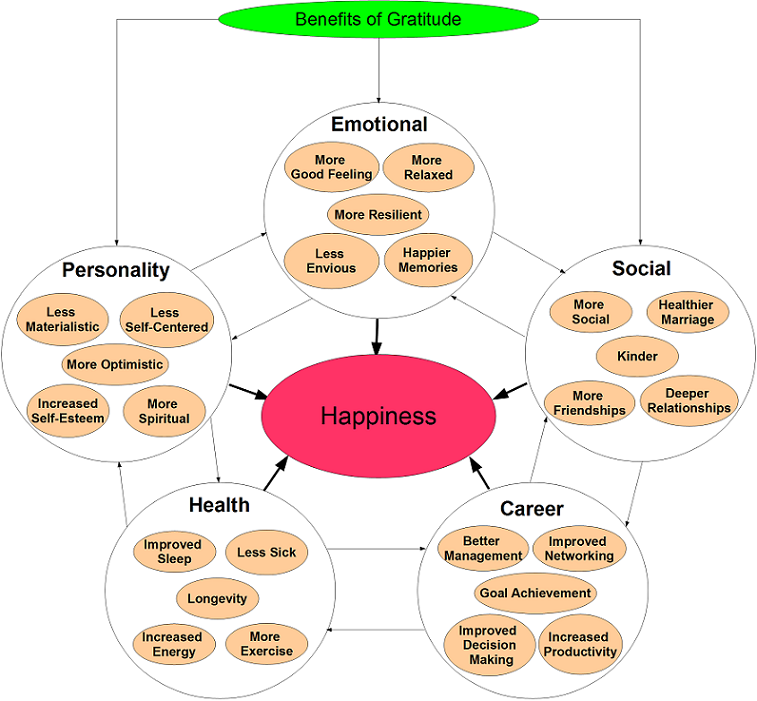
The areas gratitude has been studied and seen to have an affect are: emotional, personal/spiritual, social, health and in the work place. Lets quickly go over a few of these things.
Gratitude is shown to increase our sense of wellbeing and affects us more and for longer than getting a raise at work. That’s a pretty amazing thing, because I’ve gotten raises and they feel great!
Gratitude can cause us to have more friends. People like other people who are grateful more than they like those who are not. Who doesn’t want to be around someone who is nicer, more appreciative, and sees things in a positive light instead of whining and moaning all the time? The answer, according to this study, is most of us.
Gratitude can reduce envy, increase happiness, cause good feelings, and help us recover from stressful experiences. We become more optimistic when we are able to see and appreciate what we have and how good we feel about it. When we focus on what’s missing or what’s going wrong, we’ll see more of what’s wrong, and low and behold, we’ll get more of what’s wrong. Therefore gratitude is tied to optimism, and following the reasoning of Henry Ford, “Whether you think you can, or you think you can’t – you’re right,” In the study there was a 5-15% increase in optimism in those who kept a gratitude journal.
As for envy, There are three things that scriptures say we cannot have in Zion, they are jealousy, envy and strife. “Envy is when we lack an attribute enjoyed by another. Jealousy is when something we already possess (usually a relationship) is threatened by a third person. And so envy is a two-person situation whereas jealousy is a three-person situation. Envy is a reaction to lacking something. Jealousy is a reaction to the threat of losing something (usually someone).”1 In the studies, the personality trait of envy has a correlation of -.39 with the personality trait of gratitude. In addition, on days when people experience more gratitude, they are also more likely to experience less envy.2
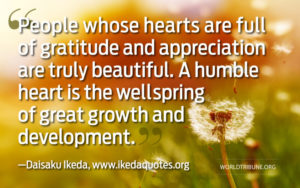 There really is no more intense pain than the feelings brought on by jealousy and envy. We feel less than others and have a deep fear of loss. These two emotions often go together because we find that those we fear loosing something or someone may have an attribute that we desire. Come to find out, gratitude helps emiliorate the negative emotions of envy.
There really is no more intense pain than the feelings brought on by jealousy and envy. We feel less than others and have a deep fear of loss. These two emotions often go together because we find that those we fear loosing something or someone may have an attribute that we desire. Come to find out, gratitude helps emiliorate the negative emotions of envy.
I can attenst to the benefit gratitude creates when I’m in envy or jealousy. I aquired my jealous, envious feelings as a young girl. My sister was older, prettier, and got the attention of my parents more easily – thus I felt both jealous and envious of her. I carried these feelings into many of my future friendships and found friends that were prettier, smarter or more gifteed. I had to learn the hard way that I was causing my friends and myself pain through this avenue of feelings. Who wants to be friends with someone who takes everything you have and all the blessings you get, as a personal wound to themselves? Not me! But I didn’t understand that until I had friends that were jealous and envious of me for what I had and am. It stinks to not be able to share your good news with your best friend because they will see it as their own personal loss. There is something really wrong with that. As I learned to be grateful for my own relationships, my own gifts, talents, blessings and experiences I stopped feeling the same kind of deep envy and jealousy. It still pop’s it’s head up once in a while, but I am able to see it for what it is, ingratitude for what I have and a need to reinvest in my own relationships while increasing the gratitude I have for what I have that is good in those relationships. With this combination I can find peace quickly if I also choose it.
Gratitude improves our careers, increases our ability to network, make decisions, manage others better, and increases productivity. This in part happens because a grateful boss or coworker makes being at work a more enjoyable place for everyone. When the environment is positive, we feel better being there. If we have an optomistic view of things then making decisions will be easier due to having confidence that what we decide will work out. If we are in fear of making a mistake because all we see is our mistakes, it will take us longer to make decisions. When we have confidence that what we are doing is going to be ok, we can get more done. It seems to me that most of these are tied together.
When we’re grateful we see things with a more optimistic point of view because we remember the good things that have happened in the past. We naturally then have confidence they can and will happen again. This is called faith. When faith increases, all our other connections and experiences improve.
This one is funny! In one study exercise increased when the participantes kept a gratitude journal. That seems random. There is only one study that shows this, but the rational is that when we are grateful for our health, we want to safeguard it and are willing to exercize. I find that when I’m grateful I have more energy and can get myself to the gym instead of lazing about on the couch.
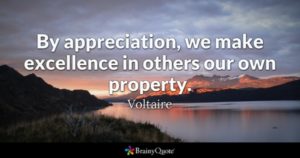 This leads us to another benefit of gratitude – we’re able to relax when we feel grateful. Well, who doesn’t relax when they stop looking around, making sure they’re keeping up with the Joneses? We go into rest and digest and ease when positive emotions and gratitude are present in our system. When we feel at ease and can focus on how things have worked out in the past, seeing the proof of good happening to us, we can more easily hold a relaxed state. Gratitude is also shown to improve sleep. Maybe we should stop counting sheep, and try counting our blessings.
This leads us to another benefit of gratitude – we’re able to relax when we feel grateful. Well, who doesn’t relax when they stop looking around, making sure they’re keeping up with the Joneses? We go into rest and digest and ease when positive emotions and gratitude are present in our system. When we feel at ease and can focus on how things have worked out in the past, seeing the proof of good happening to us, we can more easily hold a relaxed state. Gratitude is also shown to improve sleep. Maybe we should stop counting sheep, and try counting our blessings.
Gratitude improves our health. Because gratitude puts us in the parasympathetic nervous system responses (i.e. rest and digest, relaxation and ease) we have fewer stress hormones in our system causing dis-ease. It has been shown in 137 research studies that improving your mind improves your health. This could actually lead to longer life and has been shown to correlate with having more energy.
Gratitude just feels good. Those who are grateful are able to bounce back faster from disappointment, cope better with disappointment, have a better social support system, are less likely to develop PTSD, and grow in times of stress instead of becoming disabled and discourage permanantly by set backs. The PTSD one is the one that I’m most curious about! Think about it, one of two things is happening here. Either fewer harsh things happen to those who are grateful and they are actually protected from harm, OR they have the same amount of hard things happen, but are able to see their trials with a balanced, positive, grateful or learning viewpoint. Or both. When we give meaning to our struggles we give them a new context and purpose, thus moving past the pain and into the purpose and gift in the trials or struggles. Giving purose to our pain makes it a gift instead of a perpetrator. We feel empowered instead of disempowered from feeling out of control. Truly, we have taken control back because we choose to see things the way WE CHOOSE, instead of being victims to what has happened and allowing it tell us what to feel. Seeing the purpose or gift in a trial puts us in control instead of it controling us.
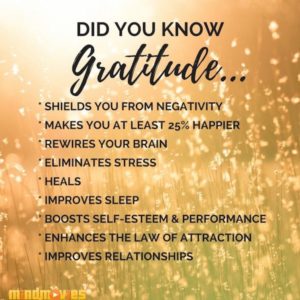 This goes along with the study showing that gratitude actually can change our memories, both good and bad ones. When we take gratitude as our guide we are able to find the gift in the memory and actually transform the old negative into a positive. We have all the power over our minds and gratitude gives us the tool to move out of victimhood and into empowerment. Those who were in a grateful place were able to find closure and recall positive aspects from memories that they had only seen as negative before.
This goes along with the study showing that gratitude actually can change our memories, both good and bad ones. When we take gratitude as our guide we are able to find the gift in the memory and actually transform the old negative into a positive. We have all the power over our minds and gratitude gives us the tool to move out of victimhood and into empowerment. Those who were in a grateful place were able to find closure and recall positive aspects from memories that they had only seen as negative before.
One affect that I think most of society could really use is the gratitude in marriage affect. As one blogger put it,
“Scientists have put numbers to our intuition and experience, creating an appreciation to naggy ratio. More formally called the Losada ratio, it divides the total number of positive expressions (support, encouragement, and appreciation) made during a typical interaction by the number of negative expressions (disapproval, sarcasm, and cynicism).”
When the ratio was below .9, that is there were 11% more negative expressions than positive expressions, marriages plummeted towards divorce or languishment. Those marriages that lasted and were found satisfying were those with a positivity ratio above 5.1 (five positive expressions to each negative). Reference here
Everyone who has been married can see and has experienced this ratio in action. I know that at one point in my marriage I was instructed by the Spirit to stop nagging and to completley focus only on my own crap. I could not speak one unkind word, make one criticism, or bring up one problem before I took it to God, did my own repentance on it and found where I was at fault first. On top of that I started seeing and saying the good things that I did see in my guy. Needless to say my marriage improved dramatically and honestly I stopped seeing anything wrong with my husband at all. The things that were there before, no longer existed to me, and actually my husbnad started to do the things I had been nagging him to do for years, without me ever asking him. I kinda was in awe and feel back in love with him again. It was a true miracle!
Socially, gratitude increases our ability to make friends, have friends for longer, and deepens friendships. Every human needs to feel connected, loved and significant. We go to great lengths to meet these needs in ourselves. I find it interesting that gratitude, paradoxically is about acknowledging what someone else has done, but brings the blessings of friendship, love and apprciation back to us more deeply. We are appreciated and loved when we appreciate and love others.
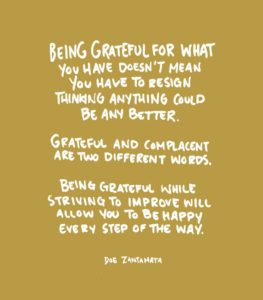 The spiritual reason that was studied about gratitude was that when we’re grateful we feel more connected to God and others. Our spirituality increases and our connection to heaven improves. If we are grateful we tend to want to find someone to be grateful to. When we see God as a generous and kind God we feel and hold more faith and trust that good things will happen in the future. This leads again to more good things and good feelings.
The spiritual reason that was studied about gratitude was that when we’re grateful we feel more connected to God and others. Our spirituality increases and our connection to heaven improves. If we are grateful we tend to want to find someone to be grateful to. When we see God as a generous and kind God we feel and hold more faith and trust that good things will happen in the future. This leads again to more good things and good feelings.
All these areas of life improve when we’re grateful. There seems to be enough proof that gratitude really does work and that we should all choose to be grateful. There are actually more reasons though. The ones that are spirtual and come as promises from God are probobly enough to get many of us to buy into this practice, but I have not yet covered those. I will be covering those in the next post.
In the next post I will go over a few of the scriptural promises given with the commandment of gratitude. a bit more of the why, then we are on to the HOW!
Leave a Reply
You must be logged in to post a comment.